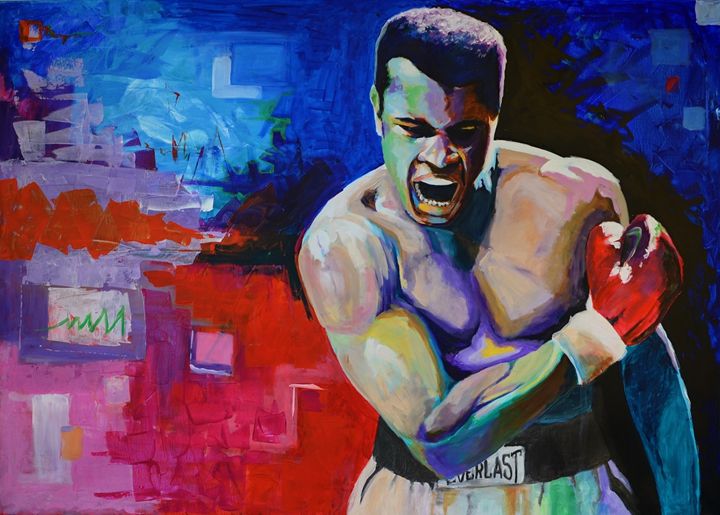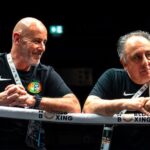
The recording may not be as polished as we have come to expect but it was a pleasure to write and record it in the space of an hour from idea to capture.
You can listen back here via the recording or read the transcript below. We will be back on air, broadcasting to a world in lockdown, next Monday with a similar piece.
Mohammed Ali was one of those human beings that became so much more than the sum of his parts.
He was voted as the greatest sportsman of the 20th century across the board when those lists were debated and argued over.
He was the Heavyweight Champion of the world three times in an era when that put him in the mind’s eye of every sporting fan in the world.
But even that would not have been enough for in the words of Billy Crystal at his memorial service in 2016 to say that when we heard the news of his death, time stopped, the world took a deep breath and sighed.
He was born in 1942 in Louisville Kentucky as Cassius Clay. It was far from a privileged background and when he was 12 years old when his bike was stolen that meant a lot. He went to the local police station and told the the officer on duty Joe Martin that if he found the thief he wanted to hit him.
Martin was involved in boxing and suggested to the young Clay that maybe he should learn to box before trying it.
In that moment, history took a turn.
The kid was good, he won Golden Gloves and then National titles before becoming Olympic Champion as a Light Heavyweight in Rome in 1960.
In sporting terms, his amateur career rollcall was 105 bouts and 100 wins.
It was inevitable that he would turn professional but he was a black man in a world where Rosa Parks had yet to sit on a bus or Martin Luther King reveal his dream on the steps of the Lincoln memorial.
Sport gave him a platform though and he made it his own. The trash talk which he perfected was inspired by a meeting in 1961 with ‘Gorgeous George’ Wagner. Others have tried it since but nobody could match the wit and speed of the Louisville Lip.
He won the World Heavyweight title for the first time defeating Sonny Liston in Miami Beach.
Shortly after he announced his conversion to Islam and adopted the name of Cassius X for a short while before then becoming Mohammed Ali.
After defending his title against Floyd Patterson in 1965 Ali established his own promotions company, a harbinger of things to come in the world of sports broadcasting and sold his own rights to his fights on pay per view and mainstream television.
Every turn he took was original, and almost every one proved to be a winner.
In March of 1966, he took a decision that cost him perhaps the four most lucrative and successful years of his boxing career when he refused to serve in the armed forces as a protest against the Vietnam War.
In a time of ferocious American nationalism and only two decades after the end of the second world was this was a decision that turned him into a pariah. His boxing licences were taken away and he was stripped of his titles.
His appeal against the bans lasted until 1971. During his absence from the fight game, he toured College campuses preaching against the war and in support of racial justice. Public opinion turned and he became a Champion in hearts and minds as well as in the ring.
After a number of small comebacks, he was once again in line for a world title fight, this time against Joe Frazier in Madison Square Garden. It was Ali’s first defeat after what was reckoned by experts to be the Fight of the Century.
The fight was broadcast to 35 countries, how times have changed.
Ali had to claw his way back. He fought six times in 1972, including at Croke Park in Dublin and in January ’74 a rematch win over Frazier back at Madison Square Garden pit him in line for another World Title bout this time against George Foreman who had beaten Frazier to gain the title.
On October 30th 1074 the Rumble in the Jungle took place in Kinshasa in Zaire. Already the expansion of TV meant that this was seen by one billion people around the globe. Ali went in as underdog but emerged as the Champ.
The build-up was Ali at his best as in this interview with David Frost…
Norman Mailer’s stunning book about the fight described the final seconds like this…
“Foreman’s arms flew out to the side like a man with a parachute jumping out of a plane, and in this doubled-over position, he tried to wander out to the centre of the ring. All the while his eyes were on Ali and he looked up with no anger as if Ali, indeed, was the man he knew best in the world and would see him on his dying day. Vertigo took George Foreman and revolved him. Still bowing from the waist in this uncomprehending position, eyes on Muhammad Ali all the way, he started to tumble and topple and fall even as he did not wish to go down. . . . He went over like a six-foot sixty-year-old butler who has just heard tragic news. . . .”
It was the high point of his boxing career. He defended the title a year later in the Thriller in Manila against old rival Joe Frazier and kept doing so until losing to rookie Leon Spinks in 1978. Ali was out of shape and lost by a split decision. Seven months later a rematch took place which Ali won to become the first man in history to win the title three times.
He retired in 1979, and then in 1980 and finally in 1981.
Over the course of his career, it is estimated that he took 200,000 punches. They took their toll and were accepted to be a contributing factor to his development of Parkinson’s Disease.
He has won himself or been the inspiration for Oscars and Grammy’s and worked throughout his later years in areas of philanthropy around the world.
Credited as being one of the Fathers of Rap music. He lit the flame of the Olympic Games in Atlanta in 1996 and was a Guest of Honour at the opening of the Special Olympics in Dublin in 2003.
He has inspired pop culture and art and was named by Time Magazine as one of the most important people of the last century.
In that BBC poll of who was the greatest sportsman on all time, he received more votes than every other contender combined.
He changed sport and in many ways changed society not only by how he fought and won but by how he lived.
Mohammed Ali. Truly the Greatest.



Image Credit: New Art PM




























